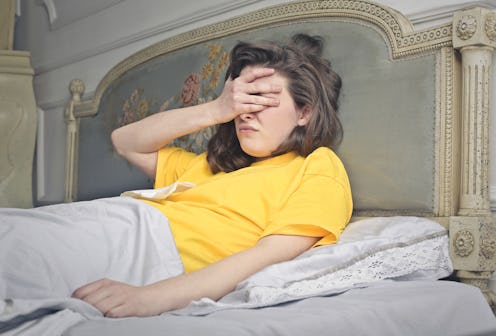Life
6 Signs You Have A Circadian Rhythm Disorder
If you have problems sleeping, it might not just be your habits that are causing a problem — something might be wrong with your body's natural clock. There are a number of signs that you have a circadian rhythm disorder, and generally these involve issues falling asleep and waking up when you need to. Your body operates on a daily rhythm of temperature and hormone levels that regulate when you go to sleep and wake up, and when this rhythm is off course, it can severely disrupt your sleep patterns.
"[A circadian rhythm disorder] is when your biological clock is out of sync with your environment, like jet lag when you are not traveling" clinical psychologist and sleep doctor Dr. Michael Breus, tells Bustle. "There are many types, including Advanced Sleep Phase Syndrome, Delayed Sleep Phase Syndrome, non-24 hour sleep syndrome, etc."
Although each disorder differs slightly, they all involve a problematic shift in your sleep/wake cycle. This can be caused by something going on internally, but it can also be a result of something external, like jet lag or shift work, according to Merck Manual. Getting to the root of your circadian rhythm disorder is important, as it can have long-term effects, including greater risk of cardiovascular and metabolic disorders.
If your sleep is out of whack and your schedule has been off, you may have a circadian rhythm disorder. Here are six signs to watch out for, according to experts.
1You Fall Asleep Early & Wake Up In The Middle Of The Night
"If you get sleepy and go to bed earlier than most people, and awaken in the middle of the night unable to fall back asleep, you may have Advanced Sleep Phase syndrome," sleep physician and neurologist Dr. Nate Watson, tells Bustle. With ASP, your body clock is shifted early, resulting in going to bed very early (around 6 to 8 p.m.) and waking up very early (around 3-4 a.m.). This circadian rhythm disorder is more common as you get older. Speak to your doctor if these symptoms have become a problem for you.
2You Can Fall Asleep During Weekends, But Not Weekdays
"If you have trouble falling asleep on nights before workdays requiring an early awakening, but not on weekends when you can go to bed and wake up later, you may have Delayed Sleep Phase syndrome," Dr. Watson says. DSP is the opposite of ASP, with your body clock being pushed back so that you go to bed late and wake up late. This disorder tends to happen more in adolescents.
3Your Sleep & Wake Time Gets Pushed Back A Little Each Day
"If you go to bed and awaken a little later each day, you may have Non-24 Hour Sleep/Wake disorder," Dr. Watson says. Because this disorder develops as a result of the failure of light to send the proper signals to the brain, it usually only occurs in those with compromised vision.
4You Have An Erratic Sleep Schedule
"If you have erratic sleep, where your sleep is not consolidated at night but rather spread throughout the day and night, you may have Irregular Sleep/Wake disorder," Dr. Watson says. "This is typically seen in people with neurodegenerative diseases." Symptoms can include chronic insomnia as well as sleepiness and can involve fragmented naps rather than long periods of sleep.
5You Can't Fall Asleep When You Travel
Jet lag — most of us are familiar with this sensation, and it too is a circadian rhythm disorder. "If you have trouble falling asleep after traveling eastbound over multiple time zones, or if you have trouble staying awake after traveling westbound over multiple time zones, you may have jet lag sleep disorder," Dr. Watson says. The more time zones you cross, the harder it is to sleep, but once you return home, your schedule should resume back to normal.
6You Work Odd Hours
Those who do shift work and work through the night and sleep through the day may experience trouble sleeping. "If you have trouble sleeping during the day and difficulty staying awake late at night during shift work you may have shift work sleep disorder," Dr. Watson says. This can cause chronic sleep deprivation.
If you think you are experiencing any of this circadian rhythm disorders, speak with your doctor, who can help you cultivate a healthy sleep/wake schedule.
